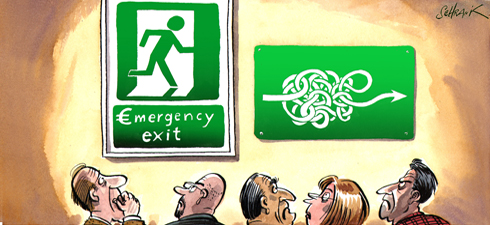In the European Union, there is a major difference between formal and informal summits. Formal summits are supposed to result in decisions, whereas the goal of informal summits, like the one held yesterday evening, is to evaluate support for a number of proposed options and to outline the compromises which play an essential role in the union.
This is exactly what happened yesterday. In the course of six hours of discussions, François Hollande pushed his pawns to challenge the position held by the German Chancellor who insisted that “eurobonds would not make any contribution to stimulating growth”.
Backed by several countries including Sweden, Finland and the Netherlands, Mrs Merkel reiterated her opposition to the idea of pooled member-state debt liability, which France wants to establish to ensure a common guarantee and standard rates of interest for Eurozone borrowing that would be significantly lower than those currently charged to weaker countries in the currency bloc.
A perfectly pragmatic debate
Given that there was no possibility of unanimous support for such an initiative, it was not expected that the idea would be retained, and this proved to be the case… However, significant change appears to be on the way.
Along with solid convergences on the necessity for shared investment, it has now been confirmed — and this is a new development — that an initiative to introduce eurobonds would have the backing of a majority of EU countries, including the UK, which usually blocks any move that could lead to a greater integration policy integration.
The lines in the debate have been redrawn and the two sides are no longer defined by liberal or social democratic political colours or their advocacy of a Europe of nations or greater federalism. In short, this is a genuine and perfectly pragmatic debate on the best means to relaunch growth and restore budgetary order – as Mrs Merkel termed it, “a balanced debate” — which will now result in the drafting of a road map.
European Council President Herman Van Rompuy has been tasked to prepare a report, to be presented on the 28 June summit, on staged development towards “a deeper monetary union”, which will notably focus on “eurobonds in a long-term perspective, integrated banking supervision and resolution and a common deposit insurance scheme".
The discreet and clever Mr Van Rompuy
So instead of attacking each other, European states have demonstrated their determination to establish greater economic integration, and the question of eurobonds will be explored within this framework.
The discreet and clever Mr Van Rompuy now has five weeks to deliver a fully orchestrated version of this new tune which will circumvent opposition between those who insist that the most fragile countries have no hope in investing in growth because they are forced to seek funding at unsustainable interest rates, and those, like Mrs Merkel, who fear that these countries will not maintain efforts to reduce their debt if they have the option of borrowing under more favourable conditions.
In view of these two positions, the only possible compromise is to push for more common regulation and further integration. And that is what Europe’s member states have decided to do, if they succeed, the European Union will once again demonstrate that it can, as always, make progress when its back is to the wall.
From Germany
“Merkozy” is truly dead and buried
<!--
/ Font Definitions /
@font-face
{font-family:Arial;
panose-1:2 11 6 4 2 2 2 2 2 4;
mso-font-charset:0;
mso-generic-font-family:auto;
mso-font-pitch:variable;
mso-font-signature:3 0 0 0 1 0;}
/ Style Definitions /
p.MsoNormal, li.MsoNormal, div.MsoNormal
{mso-style-parent:"";
margin:0cm;
margin-bottom:.0001pt;
line-height:115%;
mso-pagination:none;
font-size:11.0pt;
font-family:Arial;
mso-fareast-font-family:"Times New Roman";
mso-bidi-font-family:Arial;
color:black;
mso-ansi-language:EN-CA;
mso-fareast-language:EN-CA;}
@page Section1
{size:612.0pt 792.0pt;
margin:72.0pt 72.0pt 72.0pt 72.0pt;
mso-header-margin:35.4pt;
mso-footer-margin:35.4pt;
mso-paper-source:0;}
div.Section1
{page:Section1;}
-->The tone has changed behind the scenes in Brussels, says Die Zeit, the day after the extraordinary informal summit of 23 May. In office for less than ten days, French President Francois Hollande has broken with the agreement that distinguished the Merkel-Sarkozy duo and has set the Chancellor on the defensive with his proposals for growth and "Eurobonds". The Hamburg weekly wonders whether the proposal is robust enough to tackle the crisis —
But what is the real difference Hollande will make? What will remain of all the fanfares, of the eurobonds and the growth pact, now that his debut is behind him and the crisis has caught up with the new president? Hollande has cleverly used his first days in office to influence Europe’s agenda. He was unable to isolate Merkel, but he did put her on the back foot. In any case, the “No” [of the Chancellor] is always a difficult position to stick to if things in Europe fail to get better. Even harder to stick to, if the other side keeps coming up with proposals.
Was this article useful? If so we are delighted!
It is freely available because we believe that the right to free and independent information is essential for democracy. But this right is not guaranteed forever, and independence comes at a cost. We need your support in order to continue publishing independent, multilingual news for all Europeans.
Discover our subscription offers and their exclusive benefits and become a member of our community now!












